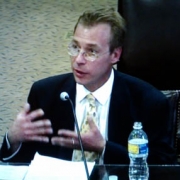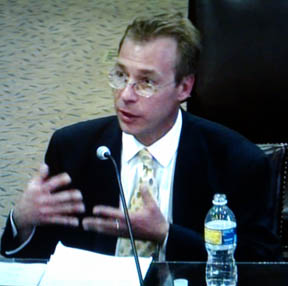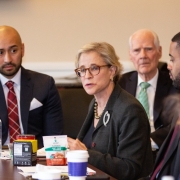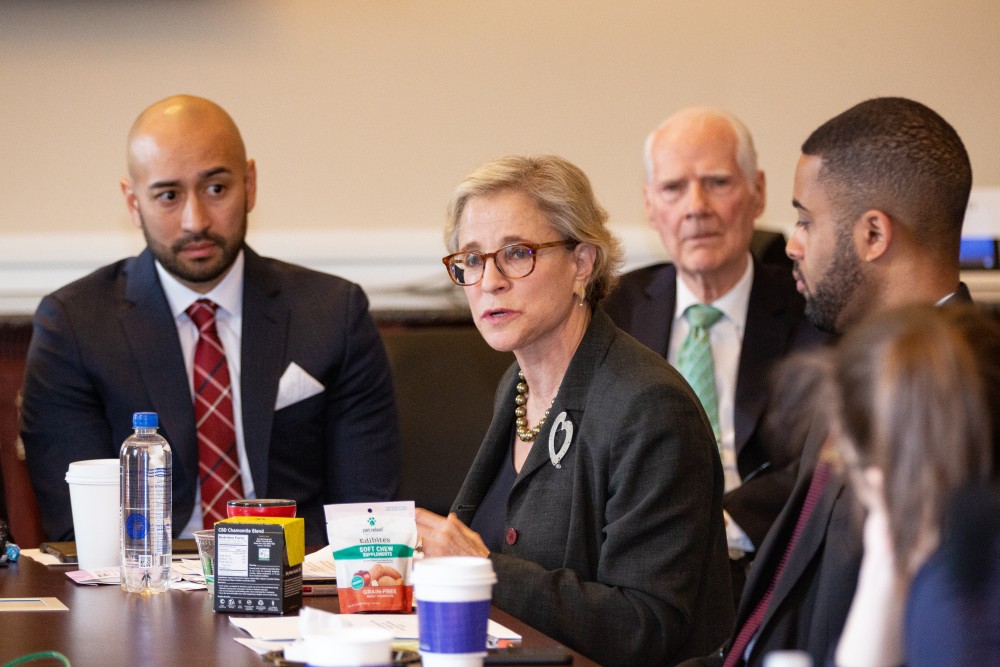Contact: National Consumers League – Carol McKay, carolm@nclnet.org, (412) 945-3242 or Taun Sterling, tauns@nclnet.org, (202) 207-2832
Washington, DC –The National Consumers League (NCL), the nation’s oldest consumer and worker advocacy organization, is demanding that the federal government put its support behind massive COVID-19 test production and, as quickly as is feasible, put in place a testing protocol for every citizen so that America can get back to work.
“There are calls across the country to reopen businesses; we understand and share that frustration,” said NCL Executive Director Sally Greenberg. “However, as we are currently not allowing tests for people who are asymptomatic—and because 25 percent of people who carry the virus don’t show symptoms—doing so would be reckless. It’s a Catch-22. Until everyone is tested, we can’t send symptom-free people back into the world. So the government’s first order of business must include giving America’s labs and drug companies the goal and the means to produce rapid-response testing for every American within the next month.”
NCL has laid out the following recommendations:
Meet the need for testing in clinics and doctors’ offices
The Food and Drug Administration (FDA) must oversee the process of improving techniques and reliable, accurate test production. Many labs are working on this, addressing the immediate need for care providers to have enough, high-quality tests.
“The Senate has voted to include $25 billion for the clinical labs that make the tests in the next COVID legislative package” said Greenberg. “That is welcome news because states cannot do this alone; they end up competing against each other for tests and other supplies.”
As Maryland Governor Larry Hogan (R-MD) said this week, “Every governor in America has been pushing and fighting and clawing to get more tests, not only from the federal government, but from every private lab in America and from across the world. It’s nowhere where it needs to be.” Virginia Governor Ralph Northam (D-VA) noted that the President’s claims that the country has enough tests for the virus are “delusional.”
Clearly, quality is paramount. The serious stumbles at such premier institutions as the Centers for Disease Control and Prevention (CDC) cannot continue. “The federal government must continue to support and expand the production of quality tests, and at capacity to meet the current needs of care providers,” said Greenberg.
Universal testing
As stated above, though, in order to get people back out to restart the economy, we cannot only test those who show serious symptoms and go to care providers to get tested. We must develop tests that can be self-administered, and in adequate numbers so that each person can test for COVID before leaving the home on any given day.
“Millions of workers have to take drug tests every day to keep their jobs; those tests are rapid-response. Consumers can buy rapid response tests for strep throat and pregnancy,” said Greenberg. “Those are approved FDA products that are tested for accuracy and safety. We must get to a rapid response COVID-19 home test as soon as possible.”
In order to determine who has COVID-19 and should be quarantined, every American must be able to test for the virus on a regular basis. Those who test positive, with or without symptoms, go into quarantine for 14 days, as do the people in that individual’s household. Those who test negative are cleared to go out in the world to get the trains running again. This would call for hundreds of millions of tests to enable on-going testing, as it is the only path forward at this time.
And the technology is not “pie-in-the-sky.” The FDA has already approved one home-test kit, though it requires lab analysis. And BARDA/HHS has funded another company to develop “a rapid antigen and antibody diagnostic to identify current or past SARS-CoV-2 infections in 60 seconds.” We are on the road.
Antibody testing
While it’s not clear how long antibodies create immunity, there is a belief that they at least do so for the short-term. So the next step would be to provide serology testing for people who test negative for COVID-19, using only tests approved by the FDA to ensure quality and accuracy. To date, the FDA has approved only four tests of the many available, but this is an important start.
Those who are determined to have a sufficient level of antibodies should be cleared to go back to work, while still wearing masks and gloves until science has confirmed decisively that antibodies create immunity. If the individuals don’t have antibodies, they would be advised to stay home, but could be cleared to go back to work so long as they test every day before heading out.
Contact tracing
Everyone who tests positive reaches out to everyone they’ve had contact with and those people test for COVID-19. Anyone then testing positive goes into quarantine, and the process repeats.
Use technology to self-surveil
Finally, we need a system for uploading test results each day to our phones – like the bar codes we use to board an airplane – or to carry evidence that we have taken the test, have antibodies to COVID-19, and can work or otherwise go out. Enforcement would be a new challenge, given our commitment to civil liberties, but one that we can certainly work out.
Longer term: Vaccinate
In a year or more, when a vaccine arrives, 95 percent of Americans will need to be vaccinated to achieve herd immunity and widespread protection.
“Our nation has the know-how and manufacturing infrastructure to produce the millions of tests needed to determine whether someone has the virus,” said Greenberg. “But due to lack of leadership at the top, our testing capacity is still, several months after the outbreak, extremely limited. To date only 3.3 million people have been tested, according to the COVID Tracking Project. That’s about 1 percent of the population. That is simply not enough.”
NCL is demanding that the Federal government respond to the current national Coronavirus emergency as President Roosevelt responded to World War II, and challenge Americans to “harness the efficient machinery of America’s manufacturers” to fight the pandemic.
“We need that call to action now, to challenge America’s labs and drug companies with the goal of producing testing for every American within the next month. Federal health care agencies including CDC, National Institutes of Health (NIH), and FDA should be their partners, and this should be a shared cost,” said Greenberg. “In the midst of the worst unemployment numbers ever seen in American history, and with millions of businesses having their existence threatened, we need federal leadership, expertise, and financial support to make this happen, and we need it now.”
###
About the National Consumers League
The National Consumers League, founded in 1899, is America’s pioneering consumer organization. Our mission is to protect and promote social and economic justice for consumers and workers in the United States and abroad. For more information, visit www.nclnet.org.





















